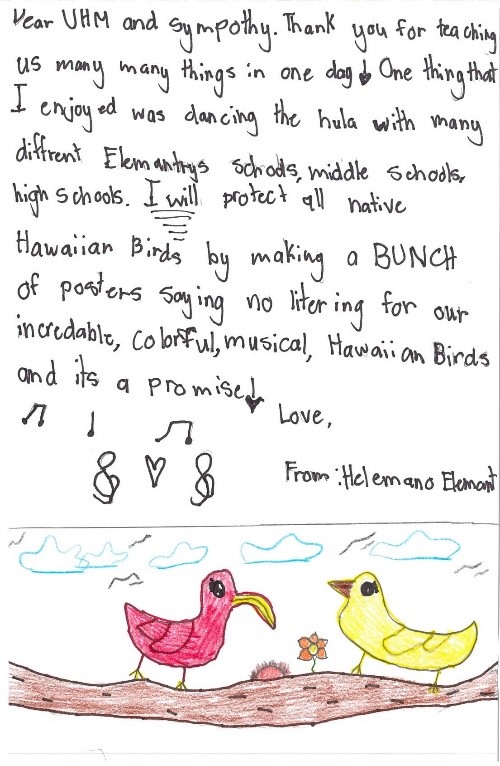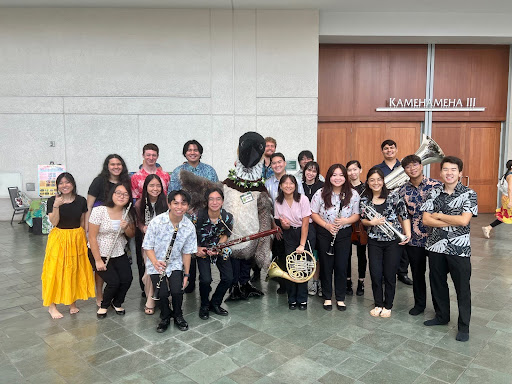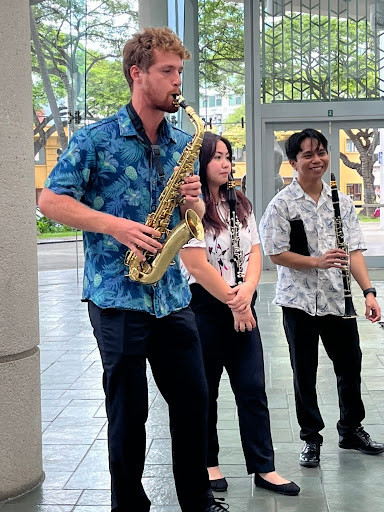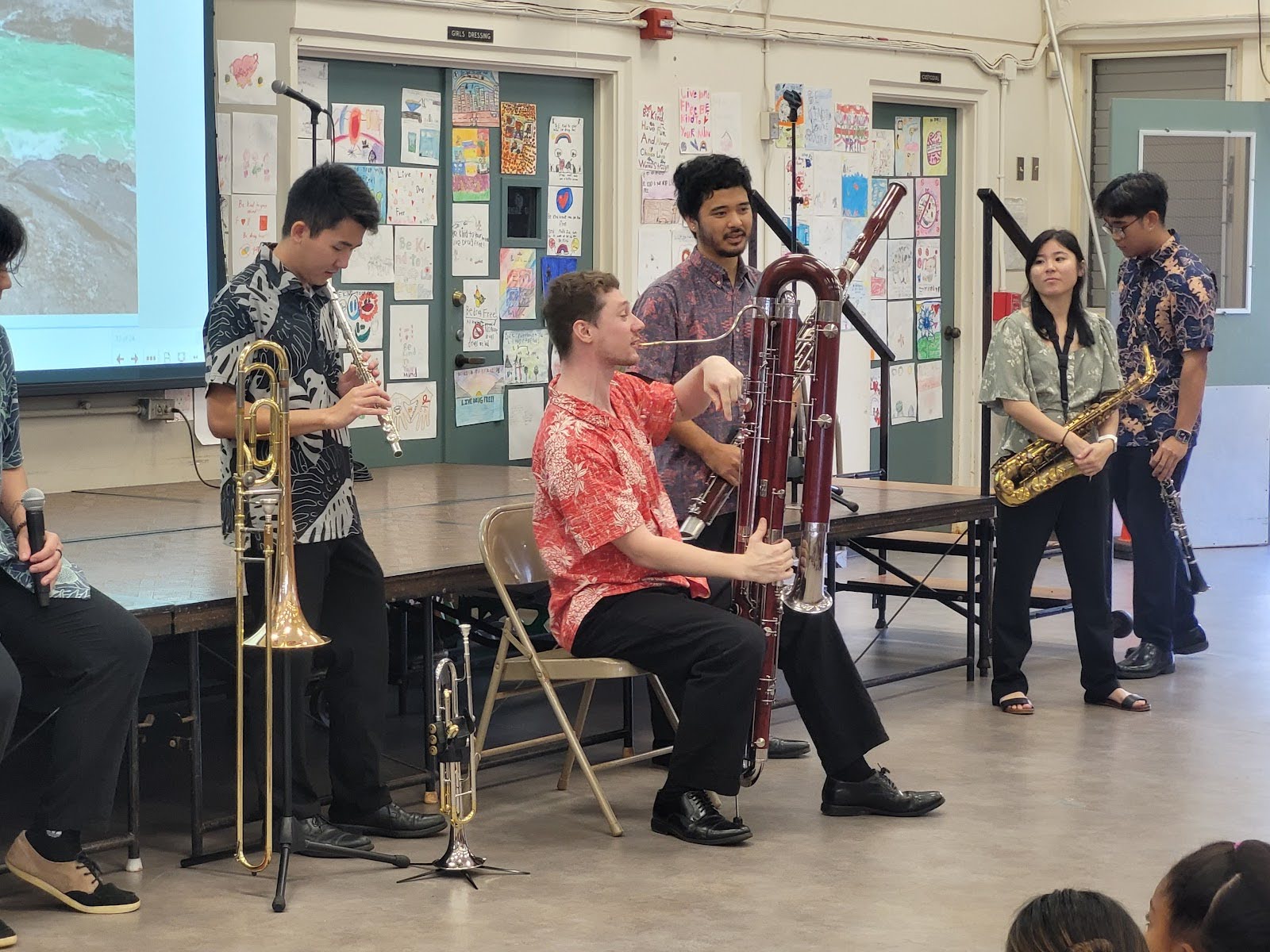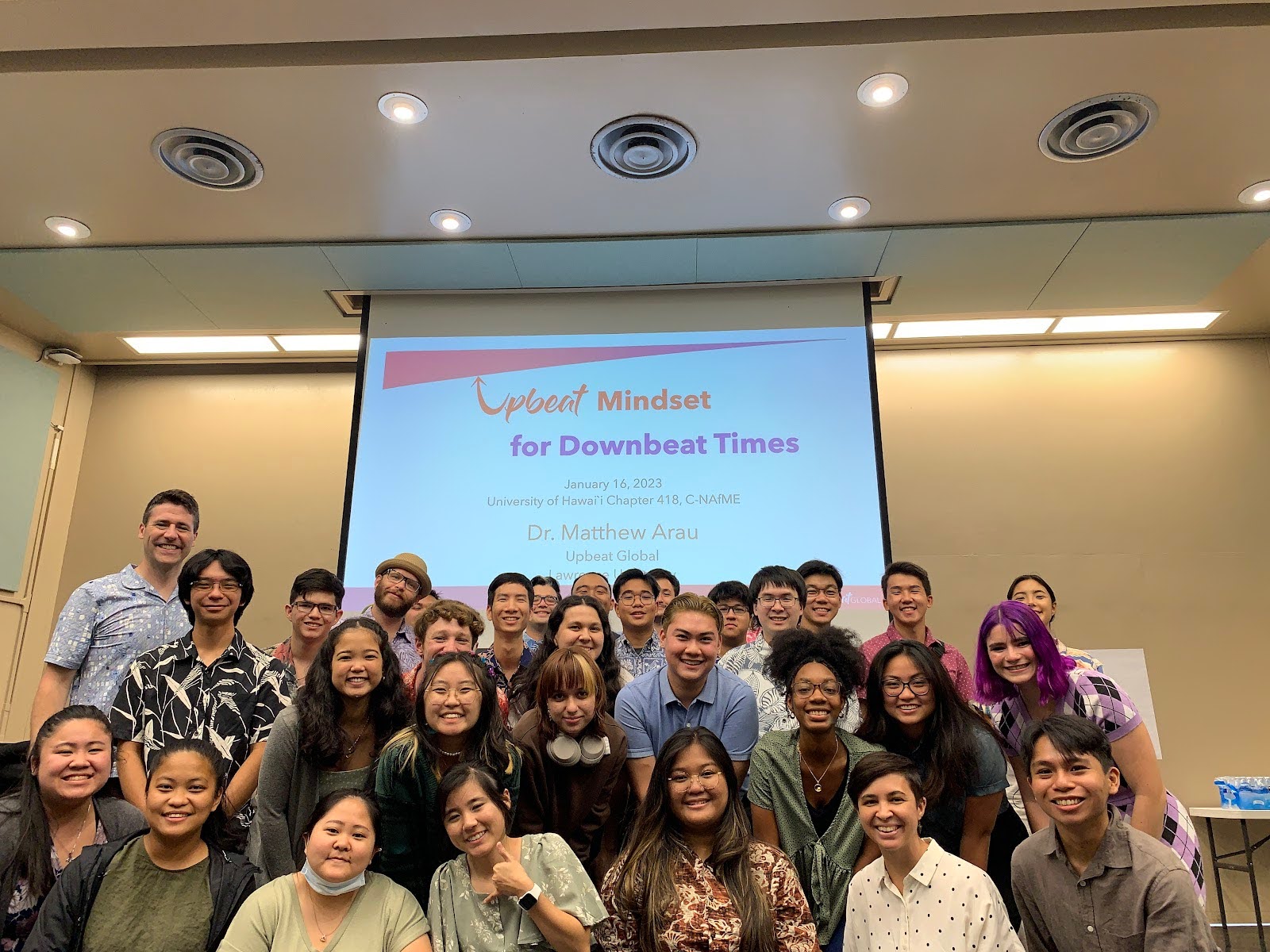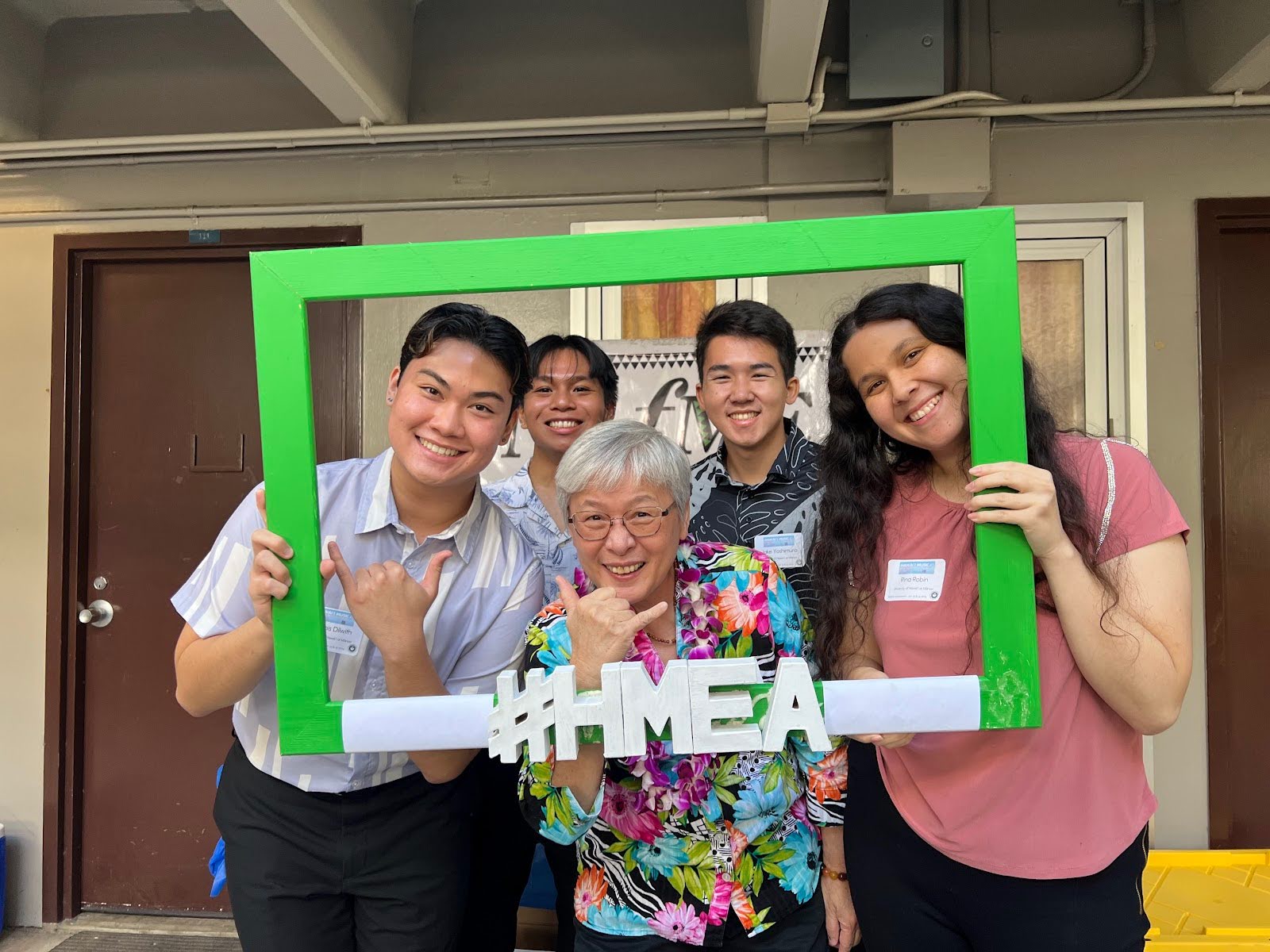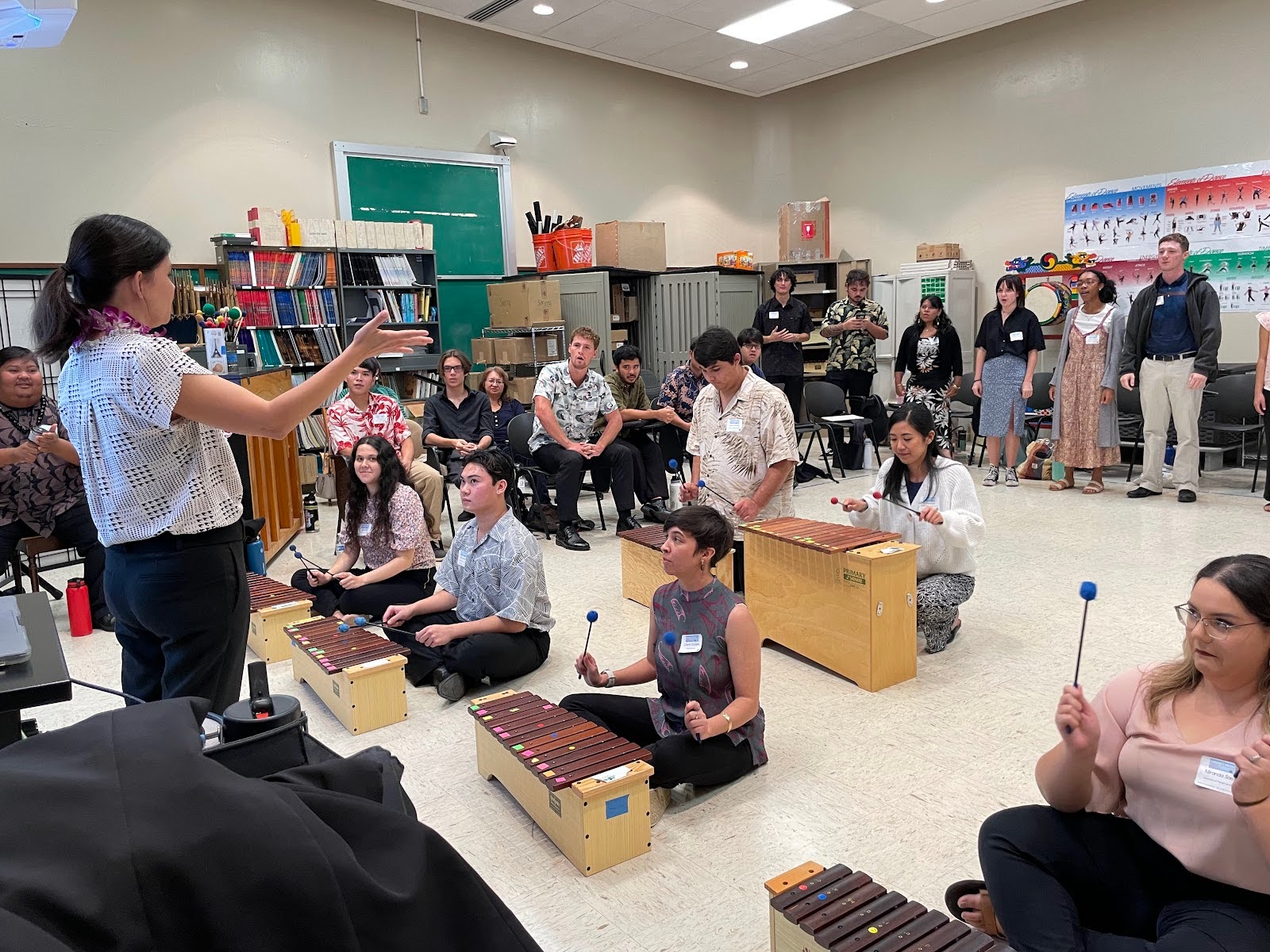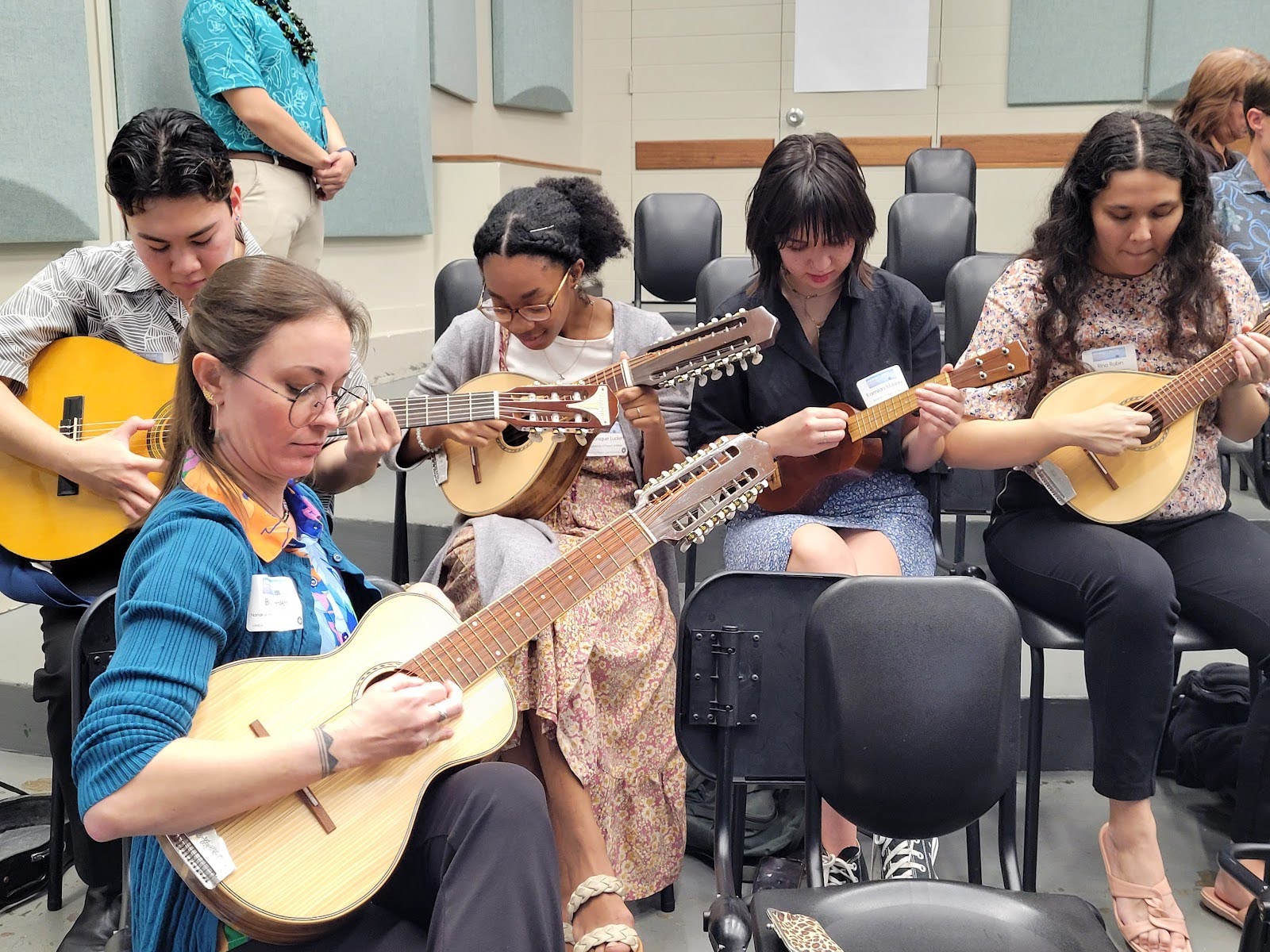Program Overview
The Music Education Area at the University of Hawaiʻi at Mānoa (UHM) offers a comprehensive program dedicated to providing public and private schools with highly skilled education professionals at all levels. Undergraduate study leads toward the Bachelor of Education (B.Ed.) degree and provides for concentration in one or more of two teaching areas: choral/general music and instrumental music (band or orchestra). A State of Hawaiʻi Teaching Certificate is reciprocally recognized in over 30 other states.
During the past five years, more than 85% of the undergraduate and post-baccalaureate students who graduated from the UHM music education program obtained full-time music positions in the state of Hawaiʻi. They are now teaching in general music, choral, and instrumental settings. Some new jobs have been created among these positions due to solid evidence of music’s positive effect on keiki.
Our undergraduate and post-baccalaureate programs are designed to meet local needs while fulfilling national standards. The music education program at the UHM is accredited by the National Association of Schools of Music (NASM). Music education majors are equipped with skills and knowledge in both music and education. In addition, we collaborate with local schools and community music organizations, providing more than 250 hours of structured fieldwork, including observation and teaching in K-12 music settings before student teaching. This process offers a valuable experience for students to develop knowledge and skills relating to teaching, build personal reflective skills, measure current competence, and plan for future professional growth.
UHM also offers M.A. (with and without teaching certification) and PhD Degrees in Music Education. Over 90% of our music education graduate students are currently full-time music teachers who teach in the state of Hawaiʻi. These full-time teachers take approximately four credits per semester, offering the opportunity to complete the degree at their own pace. Beyond required classes, graduate students are encouraged to play in instrumental, choral, and ethnic ensembles and to take applied voice, instrumental, and conducting lessons. Students also have the opportunity to take ethnomusicology classes that can increase their exposure to Asian Pacific music. Other graduate-level musicology and theory/composition classes are also offered. Scholarships are available for graduate students.
The University of Hawaiʻi at Mānoa Department of Music earned top rankings in an independent organization’s national survey of music education programs. UH Mānoa’s M.A. in Music - Music Education ranked fourth out of the 15 top programs in the U.S. in the 2021 edition of Best Value Schools. The evaluation is based on tuition and estimated completion time (UHM News, April 2021).
Student Activities

The NAfME Collegiate Chapter #418 at the University of Hawaiʻi at Mānoa consists of music education and non-music education majors interested in perpetuating the importance of our musical culture through education, performance, and community service. The chapter provides all members with the opportunity to become acquainted with leaders in the music education profession through participation in programs, demonstrations, discussions, workshops, and performances. The chapter also assists the school in various projects throughout the year and provides the opportunity to have contact with Collegiate members from other schools.
Between Fall 2018 and Spring 2019, pre-service teachers from the University of Hawaiʻi were involved in the Symphony of the Hawaiian Birds project. A continuation of the above project, pre-service teachers have participated in the Symphony of the Hawaiian Forest project since Spring 2023. These project goals are to deal with an issue critical to Hawaiian values – preserving nature, especially endangered species, forests, and cultural values. The pre-service teachers visited multiple schools, including Mānoa Elementary and Kawananakoa Middle Schools in Spring 2023 and Waiau Elementary and Washington Middle Schools in Spring 2024, teaching keiki the Water Cycle hula that explained the water cycle that can affect the growth of forests. The cycle includes beach, ocean, sun, clouds, river, waterfall, uplands, pond, and taro (will provide the website – under the NAfME chapter). The music education students also presented chamber music that reflects the water cycle. Elementary and intermediate children enjoyed learning about instruments with varying tone colors and ranges from all four orchestral instrument families - woodwind, brass, string, and percussion.
Our music education students also presented Symphony of Hawaiʻi Forest hula at the Hawaiʻi Theatre on April 20, 2023, and the Hawaiʻi Convention Center on February 15, 2024. NAfME students thoroughly enjoyed presenting the hula and chant to students from schools across the island. They were able to lead the motionsand introduce students to a variety of instruments as they entered the convention center. This experience allowed them to showcase various musical outlets, inspiring students to express themselves through music.
Music education students (graduate, post-baccalaureate, and undergraduate) actively advocate for music in elementary and secondary schools. In Fall 2021, the music education majors received a grant from the late Professor Emeritus Barbara Smith. This project presents world music, dance, and music-making among elementary keiki, specifically during COVID-19, when some students received instructions online and some face-to-face. The UHM students presented Hawaiian mele, as well as Filipino, Chinese, and Japanese folk songs, to keiki in Palolo Elementary, Waimanalo Elementary, Pohakea Elementary, Helemano Elementary, and the Big Island Waiakea Intermediate schools. Providing musical inspiration activities during COVID-19 has been challenging, but it offered a meaningful experience for the UHM students to reach K-8 students through music.  In addition, during the COVID-19 quarantine period, our music education majors created a video to help keikis learn Western classical music using a children’s folk song, Mary Had a Little Lamb. This video attracted elementary school children, who posted their comments on the website.
In addition, during the COVID-19 quarantine period, our music education majors created a video to help keikis learn Western classical music using a children’s folk song, Mary Had a Little Lamb. This video attracted elementary school children, who posted their comments on the website.
The NAfME board plays a vital role in the annual HMEA conference. Through this event, they get first-hand experience learning from educators and clinicians from around the country. These sessions include general music, choral, and instrumental techniques that help students and educators gain further ideas to better their classroom teaching. Past keynote speakers include Scott Sheehan, Dr. Tim Lautzenheiser, Matthew Arau, and many more.
Additionally, the NAfME board and the KUHACDA (Kilohana University of Hawaii American Choral Directors Association) board collaborate to host Voice Bridge Day. This annual event allows high school students from across the island to experience what it is like to earn a degree in voice and music education at UH Mānoa. These students are introduced to the voice and music education faculty, and sing in the UH Concert Choir and UH Chamber Singers.
Music Education Faculty
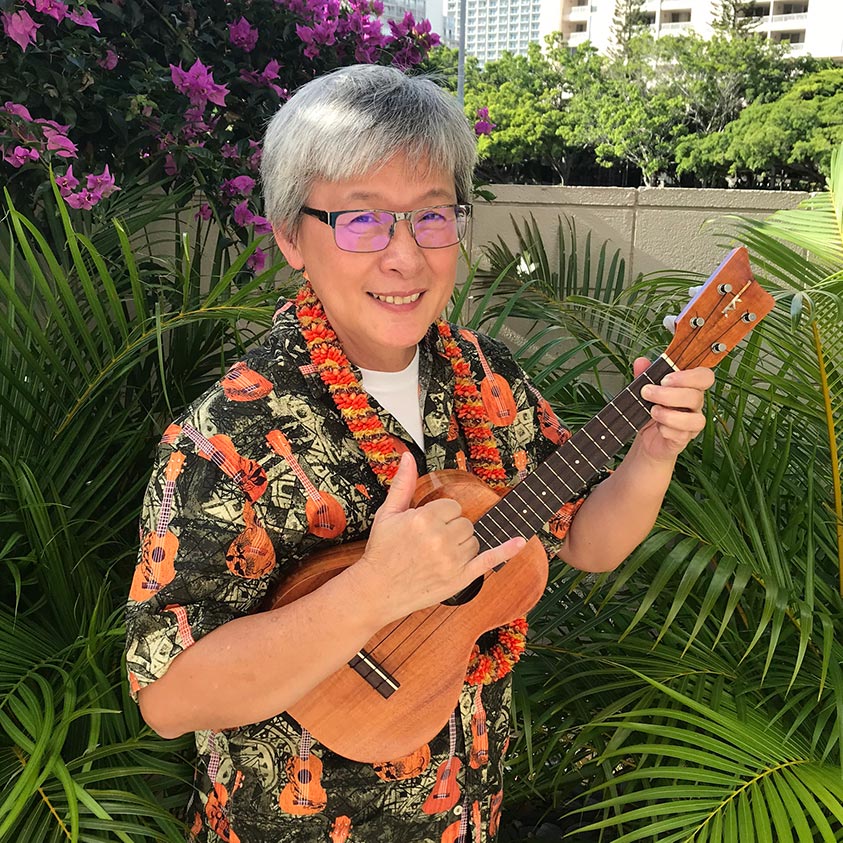
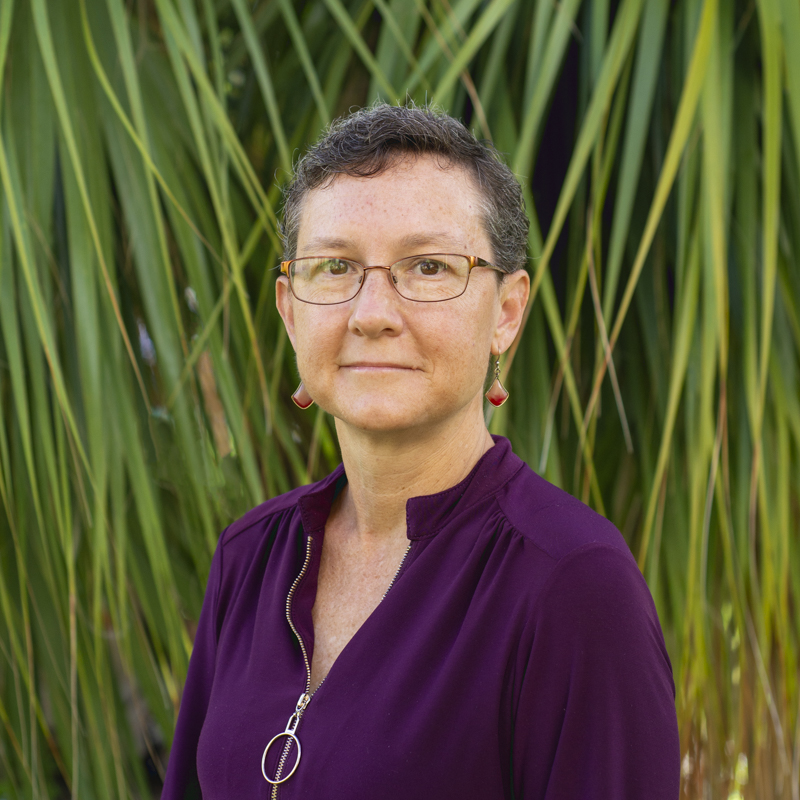
Student & Alumni Accomplishments
Students who graduate from our program serve in leadership positions in various professional organizations. The Hawaiʻi Music Education Association (HMEA) is an organization that actively conducts various programs and events around Hawaiʻi to advance music education. Every year, they hold their annual HMEA Conference, in which teachers from all islands of Hawaiʻi come together to hold educational sessions and hands-on learning activities to improve their teaching.
Kristi Higuchi-Delos Santos is currently the President; Michael Lim is the past President; Richard Akamine is the Vice President and President-Elect; Kevin Morita is the Secretary and HMEA Conference Chair; and Dennis Dilwith III is the Collegiate Chapter Representative. Most board members have graduated from UH Mānoa’s music education program.
The Hawaiʻi Orff Chapter is a local chapter that organizes general music workshops and provides resources to elementary teachers in the state of Hawaiʻi. Some of our UHM graduates also hold essential positions in the Hawaiʻi Orff Chapter: Katherine Alarcio is the Vice President, Rana Harada is the secretary, and Katie Yee is the treasurer. Even Lauren Fagaragan, the President of HOSA, who did not graduate from us; has received numerous professional trainings from the UHM during her teaching career.
The Oahu Band Director Association (OBDA) is vital in organizing solo ensembles and band and orchestra parades in the instrumental field. The organization strives to foster connections between schools and creates a collaborative group for educators to share, discuss, and improve their teaching. Mariko Niosco is the current President, and Joseph Nakamoto is the Vice-President. These fantastic educators and leaders both graduated from UH Mānoa.
The Hawaiʻi Chapter of the American String Teachers Association (HASTA) aims to promote string teaching and the development of orchestras, chamber ensembles, and solo playing at all educational levels. HASTA serves the string teachers and programs in Hawaiʻi. A UHM music education alumni, Hannah Watanabe, is the HASTA Webmistress.
The Hawai‘i Chapter of the American Choral Directors Association (HI-ACDA) is a state-run organization that serves choral musicians across our islands. HI-ACDA plays a key role in supporting the local choral community by organizing various festivals, workshops, professional development days, clinics, and meetings. These events allow choral musicians to build connections, collaborate, and gain knowledge from local and nationally recognized choral professionals. Both our alums, Christopher Serrano is the current President, and Aaron Scholtz is the President-Elect.
Our graduate students also published articles and octavos. Minhee Kim published Saeya Saeya (SA) and Jamjari Kkongkkong (SSA) through Pavane Publishing. Both pieces are Korean folk songs. Kim arranged the parts with piano accompaniment. The lyrics are in the native language, which helps children learn the Korean language and simultaneously learn about the culture.
Nicholas Matherne and Cathlyn Momohara-Ho were the second and third authors of “Pre-service Music Teachers Perceptions of Teaching and Learning Popular Music,” which was published in the Journal of Music Teacher Education, 31(2), 49-65, in 2022. In this study, participants enrolled in a popular music pedagogy course implemented techniques while working with elementary ‘ukulele students. The researchers shared their initial findings at the Virtual Modern Band Summit 2020. They also wrote a chapter detailing the study’s structure in Action-Based Pedagogies for Popular Music Education: A Practical Guide (Eds. Holley et al., 2021).
To further their professional development in the field of music education, in the summer of 2023, five of our alums, Katherine Alarcio, Janice Boychuk, Minhee Kim, Daniel Ho, Cathlyn Momohara-Ho, and our advocate, Lauren Fagaragan, completed Orff-Schulwerk Level III under the directions of Beth Ann Hepburn, Michelle Fella Przybylowski, and Paul Hallsted. This was the first time in the history of Hawai`i that Level III was offered. Przybylowski commented, “The first group of 9 Music Educators successfully completed their American Orff-Schulwerk Certification last summer at the University of Hawaii. It was a journey they chose to bring a deeper understanding of elemental music to their curriculum. The nine music educators demonstrated a deep understanding through their musicianship and teaching. Congratulations to the first group to be AOSA Certified in this program.”
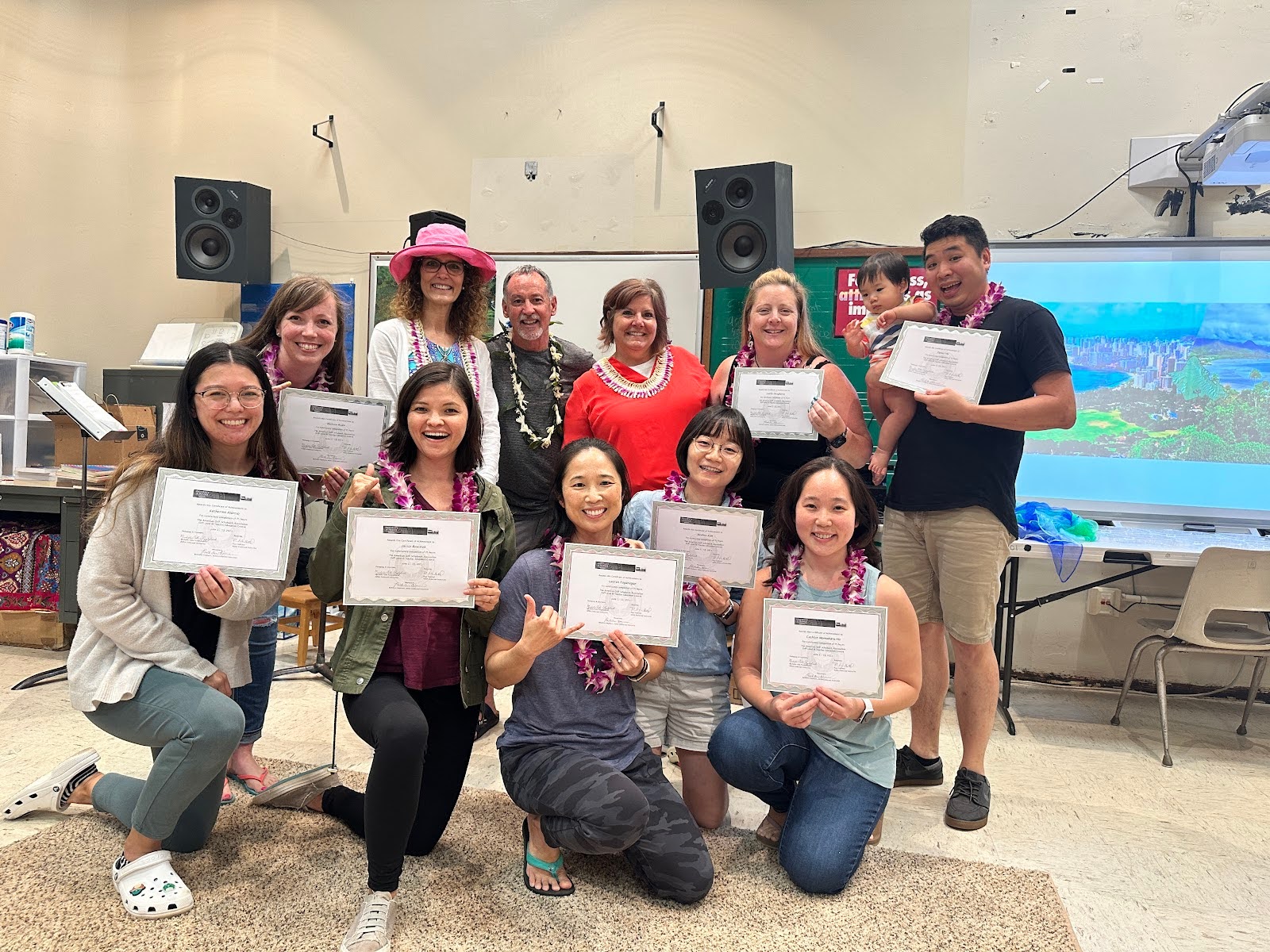
Orff Level III
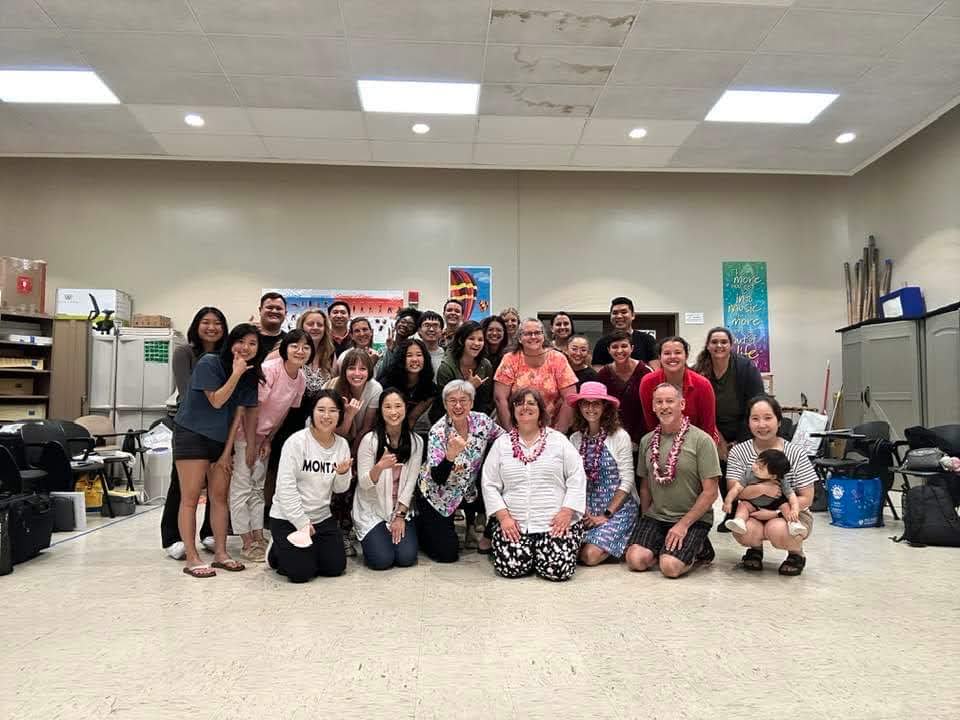
Three of our alums, Janice Boychuk, Kevin Morita, and Katherine Alarcio, received a grant from Hawaiʻi Online Portal for Education (HOPE) in 2022 and created digital resources for educators (Unit 1 & 2). The content related to Social Emotional Learning(SEL) and Nā Hopena A’o Statements HĀ: BREATH standards was further developed. The resources are shared on the Pūnaewele Mele (music network) website, with the hope that the materials and activities will help keikis to manage social and emotional challenges and promote acceptance, diversity, and respect (culturally responsive teaching) among the citizens of our country during post-COVID-19 challenging time.
Hawaiʻi Department of Education (DOE) will launch the state standards in Fall 2025. To help the music educators familiarize themselves with the standards, in 2022-2023, Hawaiʻi Community Foundation and DOE provided grants to create lesson plans and videos to explain the strategies that can be implemented in the classrooms. Our alums, Michael Lim, presented strings lesson plans and videos; Clement Zhang presented band; Miguel Cadoy illustrated choral; and Lauren Fagaragan presented elementary general music lessons and videos. They constructed lesson plans and videos to demonstrate the National Core Arts Standards (NCAS) in elementary general music, intermediate band and orchestra, and high school choral settings.
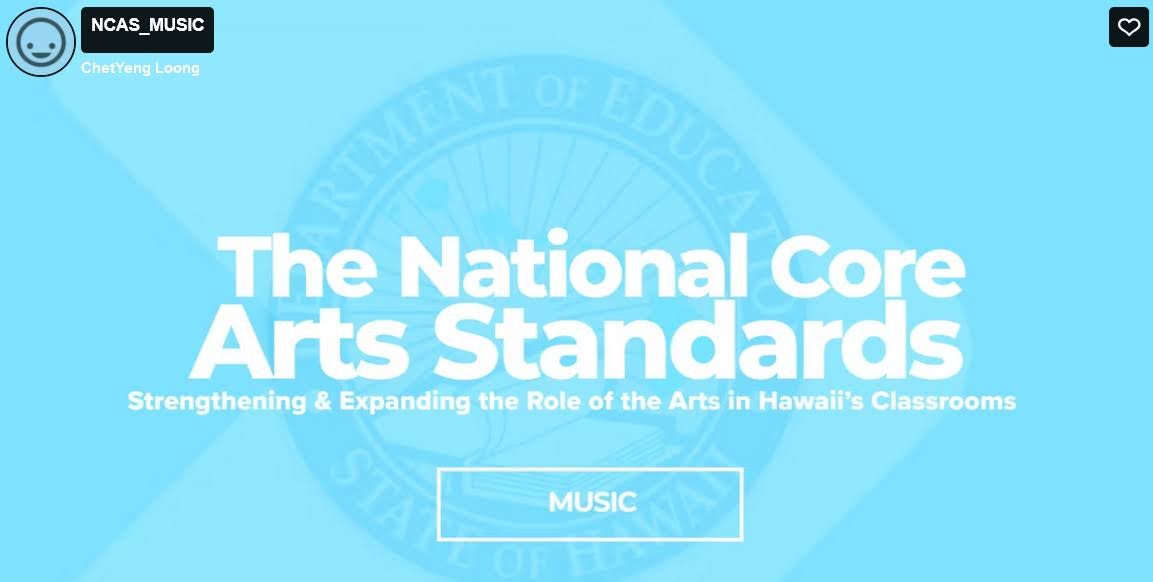
Website: https://www.punaewele-mele.org/ncas-main/
To further involve more educators in learning the standards, DOE offered a free PDE3 Credit Course: Unpacking NCAS Music between Fall 2023 and Spring 2024. Our alumni, Janice Boychuk and Daniel Ho helped coordinate the sessions. This course allowed participants to deepen their understanding of NCAS Music. At the end of the course, twelve educators who graduated from the music education area revised the standards and provided a suggested music curriculum that enables teachers in the state to relate standards to the curriculum and use the strategies to assist students in exhibiting skills and knowledge and express creative ideas through music. (Click here for link)
In Spring 2021, when schools faced challenges dealing with COVID-19, one of our alumni, Miguel Cadoy III, worked with high school students and presented a virtual production of the spring musical Disney’s “The Little Mermaid.” It was a successful event, with over 1,000 online viewers. In Spring 2022, Miguel was asked to swing into the role of Judas in Jesus Christ Superstar at the Diamond Head Theatre where he received great reviews from the audience. Miguel Cadoy III is performing with Disney Cruise Line with the inaugural cast of Disney’s The Tale of Moana on their newest cruise ship, the Disney Treasure.
Our program graduates have been actively publishing and presenting their work in state and national venues. They are on the frontiers in this field of Arts Education in the state of Hawaiʻi. Kudos to them! Keep up the excellent work.

